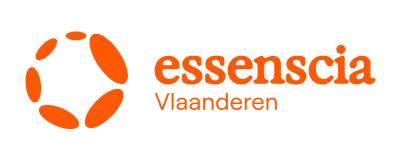Topics
We organise our actions in six thematic & strategic agendas:
Strategic Agendas:
Bio-economy
Circular Construction
Chemicals/Plastics
Manufacturing Industry
Food Chain
Water Cycles
Seven leverages provide additional support:
Leverage effects:
Lever Policy Instruments
Lever Circular Procurement
Lever Communication
Lever Innovation & Entrepreneurship
Lever Financing
Lever Jobs & Skills
Lever Research
What, why and how?
Why are we pursuing a circular economy?
Future visions 2050
How do we see our circular future?
About our management
Who steers what at Flanders Circular?
BioFab Vlaanderen
Growing sustainable materials on fungi
The waste issue and the depletion of raw materials are issues we cannot ignore. Under the motto 'prevention is better than cure', biomaterials can be part of the solution: they are biodegradable and renewable.
However, these materials are still in the ascendant and could use a strong push. That is exactly why ReaGent, Ekoli, GLIMPS and Break it Down started the project BioFab Flanders.
With BioFab Flanders we want to develop the whole ecosystem around biofabrication, production using biological materials and additives, in Flanders. In order to achieve this, we are focusing on five points:
- the development of a business case for research and product development in biofabrication
- a bootcamp programme to train professionals in biofabrication
- introductory biofabrication workshops to a wider audience across Flanders
- a biofabrication educational kit aimed at children
- an online and offline communication campaign on biofabrication projects
ReaGent
Partners Ekoli, Magma Nova, Break it Down
Sectors
Themes
Organisations
Website
MOST IMPORTANT
RESULTS
- By means of a business case, we investigated the potential of research and product development in biofabrication. A bio-engineer, product developer and project manager worked together on different market analyses, prototypes and strategies.
- We created 2 bootcamp programmes. The Mycomaterial Trainings enabled professionals to learn about mycomaterials (products based on mycelium threads) at a higher level. The Biofabrication Bootcamp focused on different biofabrication technologies and design methods. There were 22 participants in total and we received many positive reactions.
- In order to make citizens, and maybe new pioneers in the making, more aware of biofabrication, we also organised introductory biofabrication workshops for a wider audience. We exceeded our targets and eventually gave 106 workshops in 22 cities.
- To also appeal to a younger audience, we developed an accessible, educational kit on mycelial materials for teachers: 'Zwamwerk'. It forms a practical experiment across different disciplines: biology, materials science, design etc.
MOST IMPORTANT
LESSONS LEARNED
- Biofabrication is still in a turbulent, early growth phase. Many have the will to innovate, but there is too little basic infrastructure of shared knowledge, experts, interdisciplinary labs, standard training courses, etc. To get more innovations on the market, the entire ecosystem of knowledge must be further strengthened.
- Collaborating and sharing knowledge with partners is necessary to achieve change. This sometimes also means helping others on their way, even if they then continue on their own. Innovation is still too often accompanied by a closed mindset because of intellectual property.
- Education deserves special attention. After all, it largely facilitates innovative research and can also create a through-flow of students doing doctoral work or starting companies in biofabrication.
- The standardisation of biomaterials may still constitute legal barriers. These barriers are more specific to material innovation in general than to biomaterials or biofabrication in particular. Researching and drawing up standards for fire safety, strength, acoustic properties, etc. is an expensive business.
WHAT DOES
THE FUTURE HOLD?
Biobased production is still very new and difficult to scale up at the moment. In order to link up with existing initiatives that aim to accelerate the transition to a bio-based future, in the coming years we will mainly focus on making the connection with circular bio-economy. By offering services on the valorisation of residual flows, to which, among other things, biofabrication technology can be applied, we want to introduce this innovative technology in Flanders.
In addition, we want to continue to focus on education. Among other things, to further spread knowledge on biofabrication, but also to provide guidance on impact entrepreneurship. In order to build up a future industry in Flanders around biofabrication, we want to help researchers active in this field translate their research into an industry, for example by helping them with the business side of their research.
A threshold that still needs to be worked on is intellectual property. The patent landscape is not very transparent. That closed mindset works against innovation and is even counterproductive for the ecosystem. That is why open innovation seems to us to be the future, at least in the innovation phase. Later, in the commercialisation phase, companies can still opt for a more closed approach.
Finally, applications in biofabrication remain relatively unknown and exotic to humans. Where some people find it an added value that a product is made from mycomaterial, others will sometimes experience it as something negative. It remains a challenge to find the right product market fit for this technology.

















